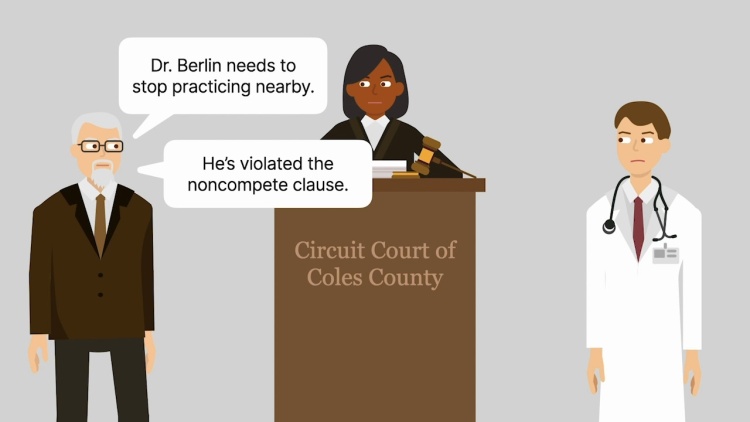Berlin v. Sarah Bush Lincoln Health Center
Illinois Supreme Court
688 N.E.2d 106 (1997)
- Written by Abby Roughton, JD
Facts
Dr. Richard Berlin, Jr. (plaintiff) entered into a written agreement with Sarah Bush Lincoln Health Center (Health Center) (defendant) under which the nonprofit hospital-corporation would employ Berlin as a practicing physician for a five-year term. The agreement contained a restrictive covenant that prohibited Berlin from providing health services within a 50-mile radius of the Health Center for two years after the end of his employment contract. After Berlin resigned from the Health Center, he began working for a health clinic approximately one mile from the Health Center. The Health Center filed an action seeking injunctive relief prohibiting Berlin from practicing at the clinic. Berlin then filed a complaint seeking a declaratory judgment that the restrictive covenant was unenforceable. Berlin also filed a supporting motion for summary judgment. The trial court granted Berlin’s summary-judgment motion on the basis that the nonprofit hospital was practicing medicine in violation of the corporate-practice-of-medicine doctrine. Thus, the court concluded, Berlin’s entire agreement with the Health Center was unenforceable. The appellate court affirmed, and the Health Center petitioned the Illinois Supreme Court to review the matter.
Rule of Law
Issue
Holding and Reasoning (Nickels, J.)
Dissent (Harrison, J.)
What to do next…
Here's why 899,000 law students have relied on our case briefs:
- Written by law professors and practitioners, not other law students. 47,000 briefs, keyed to 994 casebooks. Top-notch customer support.
- The right amount of information, includes the facts, issues, rule of law, holding and reasoning, and any concurrences and dissents.
- Access in your classes, works on your mobile and tablet. Massive library of related video lessons and high quality multiple-choice questions.
- Easy to use, uniform format for every case brief. Written in plain English, not in legalese. Our briefs summarize and simplify; they don’t just repeat the court’s language.





